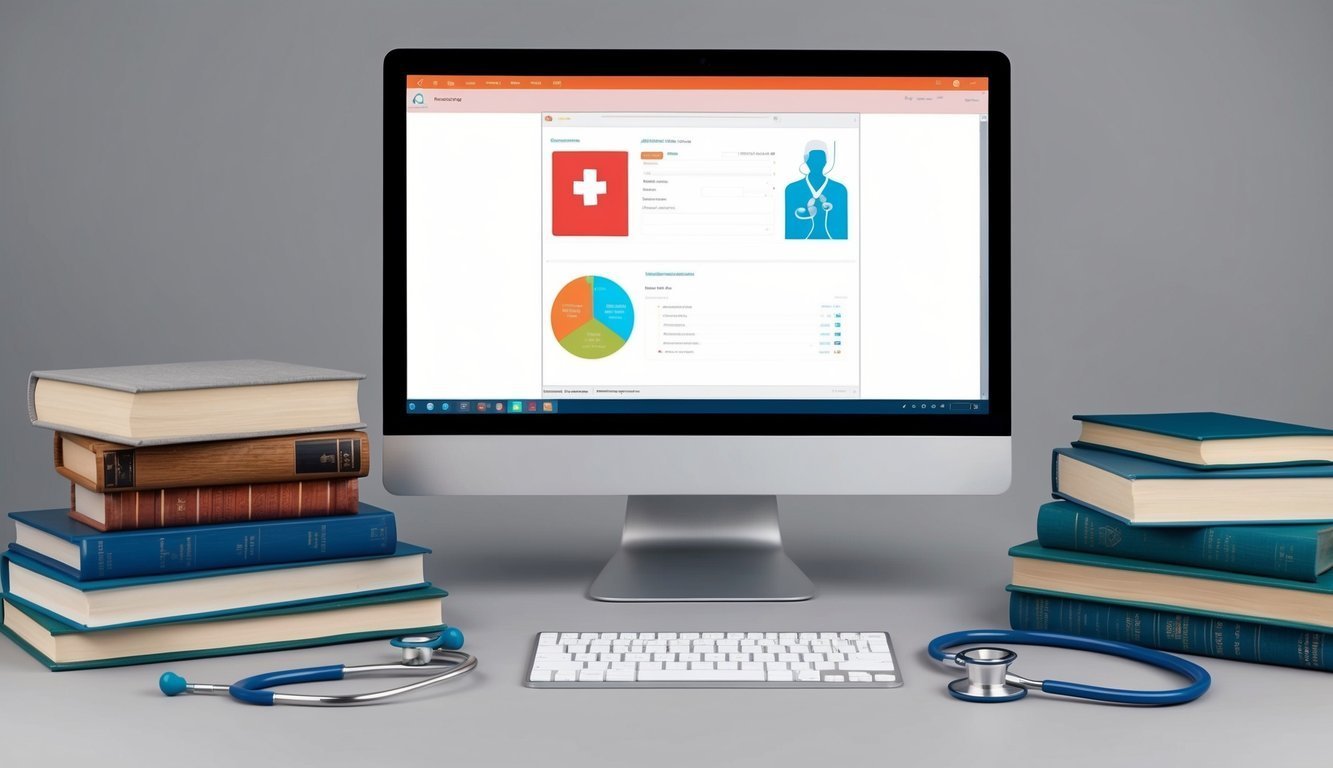The role of a nurse informaticist is becoming essential in today’s healthcare environment.
As technology advances, the need for professionals who can bridge the gap between nursing and information technology grows.
To become a nurse informaticist, you need a combination of nursing knowledge, technical skills, and formal education.
This career path not only enhances patient care but also improves healthcare delivery systems.
Starting your journey involves earning a nursing degree and gaining clinical experience as a registered nurse.
You will also need to pursue certifications in nursing informatics, which demonstrate your proficiency in this specialized field.
By evolving your skills and understanding of technology, you can significantly impact how patient information is managed, analyzed, and utilized.
The demand for nurse informaticists is on the rise, and with the right qualifications and a commitment to professional development, you can secure a rewarding position in this fast-growing area of healthcare.
Key Takeaways
- Obtain a nursing degree and relevant certifications to qualify.
- Gain clinical experience to enhance your knowledge and skills.
- Stay updated through professional development opportunities in technology.
Education and Certification
To become a nurse informaticist, specific educational paths and certifications are essential.
You will need a nursing degree and may also consider advanced education, followed by obtaining relevant certifications to enhance your expertise in health informatics.
Acquiring a Nursing Degree
To start your journey, you must earn a nursing degree.
The common options include an Associate Degree in Nursing (ADN) or a Bachelor of Science in Nursing (BSN).
Most employers prefer a BSN, which can open more job opportunities in nursing informatics.
After completing your degree, you will need to pass the National Council Licensure Examination (NCLEX-RN) to become a registered nurse (RN).
This certification will allow you to practice as a nurse and is a crucial step before specializing in informatics.
Furthering Education with an Advanced Degree
After obtaining your RN, advancing your education can be beneficial.
Many informaticists pursue a Master of Science in Nursing (MSN) with a focus on health informatics.
Alternatively, a Doctor of Nursing Practice (DNP) can provide deep knowledge and research skills in this field.
These advanced degrees help you develop a strong foundation in both nursing and informatics, which is necessary for leadership roles.
They will also enhance your qualifications and make you more competitive in the job market.
Certification in Nursing Informatics
Once you have your degree, certification in nursing informatics is the next step.
The American Nurses Credentialing Center (ANCC) offers the Informatics Nursing Certification (RN-BC).
To qualify, you need an active RN license, two years of nursing experience, and 30 hours of continuing education in nursing informatics.
Obtaining this certification will validate your expertise and make you more attractive to employers.
It also demonstrates your commitment to the field, enhancing your professional credibility and career prospects.
For detailed certification requirements, visit the ANCC website.
Clinical Experience and Technology

Clinical experience is crucial for becoming a nurse informaticist.
You need to combine direct patient care experience with an understanding of technology.
This blend helps you to improve patient safety and the efficiency of healthcare systems.
Gaining Clinical Experience
To start, obtaining your RN license is essential.
This license allows you to work with patients and gain firsthand experience in a clinical setting.
Focus on roles in various healthcare environments, like hospitals and clinics.
Here are key areas to consider for gaining experience:
- Bedside Care: Provide direct patient care to understand the workflow and challenges in nursing.
- Specializations: Work in areas like critical care or pediatrics to broaden your understanding of patient needs.
- Mentorship: Seek guidance from experienced nurse informaticists who can offer insights into the technology used in healthcare.
This range of experiences prepares you for understanding how to integrate technology effectively in nursing.
Integrating Technology with Patient Care
Technology plays a vital role in modern nursing.
Familiarity with tools like electronic health records (EHRs) and clinical information systems is essential.
These systems streamline patient data management, helping to enhance patient safety.
Key technologies to focus on include:
- Electronic Health Records (EHRs): Make sure you know how to input and retrieve patient data accurately.
- Clinical Information Systems: Learn how these systems manage the data flow in hospitals, impacting patient care.
- Data Analysis Tools: Understanding analytics can help you evaluate patient outcomes and improve care practices.
Your ability to utilize these technologies will directly influence the quality of care provided to patients.
Skills and Knowledge Base

To succeed as a nurse informaticist, you need a mix of technical and leadership skills.
These skills enable you to effectively manage healthcare data and lead projects within the nursing field.
Developing Technical Skills
Technical skills are essential for a nurse informaticist.
You should focus on information technology and data analysis.
Familiarity with electronic health records (EHR) systems is critical.
Understanding how to optimize these systems can improve patient care.
Here are some key areas to concentrate on:
- Data Management: Know how to collect, store, and analyze healthcare data.
- Software Proficiency: Be skilled in software applications used in healthcare settings.
- Information Systems: Familiarize yourself with the systems that support clinical workflows.
Improving your critical thinking skills will help you interpret data effectively.
With these technical skills, you can bridge the gap between clinical practices and technology for better patient outcomes.
Cultivating Leadership and Management Skills
As a nurse informaticist, strong leadership and management skills are just as important as technical ones.
You often take on project management roles, guiding teams through transitions and implementations.
Key skills to develop include:
- Interpersonal Skills: Foster relationships with team members and stakeholders. Good communication ensures everyone is on the same page.
- Project Management: Learn to plan, execute, and evaluate projects efficiently. Familiarity with project management tools can also be beneficial.
- Clinical Knowledge: Understanding nursing practices will help you make informed decisions regarding technology usage in patient care.
By cultivating these skills, you will be better equipped to lead projects that enhance nursing workflows and improve patient care.
Professional Development and Career Pathways
As you pursue a career as a nurse informaticist, understanding professional development and the pathways available can help you advance in this field.
Focusing on continuing education and available advancement opportunities is crucial for success.
Continuing Education and Specializations
Continuing education is essential for informatics nurses.
It allows you to stay current with the latest technologies and practices in healthcare.
You can explore various specializations, such as clinical informatics or health information management.
Organizations like the Healthcare Information and Management Systems Society (HIMSS) offer valuable certifications in nursing informatics.
These credentials can enhance your resume and increase your job prospects.
Consider enrolling in advanced degree programs, which may include a Master’s of Science in Nursing (MSN) focusing on informatics.
Many programs offer accelerated options for RNs.
You can complete these programs in about 12-20 months.
Regular workshops and conferences can also help you network and stay informed about industry trends.
Engaging in these activities provides opportunities to learn from leaders in nursing management and informatics education.
Advancement Opportunities in Health Care
You have several pathways for advancement in healthcare as a nurse informaticist.
A common goal is to advance to leadership positions, such as a Chief Nursing Officer or a Medical and Health Services Manager.
With experience and further education, you may also take on roles that involve overseeing health information systems.
This includes working with teams to implement electronic health records (EHRs) effectively.
The job outlook for informatics nurses is promising, with many organizations prioritizing data management.
This increased focus translates into a higher demand for skilled professionals.
Consider joining professional organizations to connect with peers and mentors.
Engaging in these networks can help you learn about job opportunities and best practices in the field.
Impacting Healthcare Delivery
As a nurse informaticist, you play a crucial role in improving healthcare delivery.
Your expertise in utilizing health data systems and clinical decision support systems shapes both policy and practice in various ways.
Influencing Healthcare Policy
Informatics nurses influence healthcare policy by advocating for evidence-based practices.
You can analyze health data to identify trends that support necessary changes in policies.
This helps to ensure that patient-centered care is at the forefront of new regulations.
You also collaborate with policymakers to share insights from the nursing perspective.
Your input can shape frameworks that govern electronic health records (EHRs) and data sharing, enhancing communication among healthcare providers.
By utilizing your knowledge of healthcare delivery systems, you can contribute to developing policies that improve access to care, manage costs, and enhance overall public health initiatives.
Enhancing Patient Outcomes with Informatics
Informatics plays a critical role in enhancing patient outcomes through improved clinical decision support systems.
These systems help healthcare providers make informed decisions based on real-time data and evidence.
With your expertise, you ensure that these tools provide relevant alerts and recommendations tailored to patient needs.
Additionally, by streamlining health data systems, you help reduce errors and improve patient safety.
You can implement training programs for staff to effectively use these systems.
This training enhances their ability to deliver high-quality care.
Patient outcomes are also improved through the integration of technology in patient care workflows.
You enable better communication and coordination among healthcare teams, which leads to more efficient treatment plans.
Frequently Asked Questions
To pursue a career in nursing informatics, you will need specific educational qualifications and certifications.
The transition from a general RN role to nursing informatics can vary in length andrequirements.
Here are detailed answers to common questions people have about this career path.
What educational qualifications are required to pursue a career in nursing informatics?
You typically need at least a Bachelor of Science in Nursing (BSN) to start a career in nursing informatics.
While some positions may accept an Associate Degree in Nursing (ADN), a BSN is often preferred.
Additional education, such as a master’s degree in nursing informatics, can make you a more competitive candidate.
How long typically does it take to become an informatics nurse?
Becoming a nursing informaticist usually takes about four years if you start with a BSN program.
If you already have a nursing degree, obtaining a certification in informatics may take an additional few months to a year, depending on the specific program you choose.
What certifications are needed for a nurse specializing in informatics?
You may consider obtaining certifications like the Certified Informatics Nurse (CIN) through the American Nurses Credentialing Center (ANCC).
This certification requires you to have a valid RN license and to have worked at least 2,000 hours in informatics nursing within the past three years.
What is the average salary for nursing informatics professionals?
The average salary for nursing informatics professionals can vary based on location and experience.
Generally, you can expect to earn between $80,000 and $120,000 annually.
Experienced nurse informaticists in leadership roles can earn even more.
How can I transition from a general RN role to a specialized role in nursing informatics?
To transition from a general RN role to nursing informatics, start by gaining experience in healthcare technology.
Consider additional training in data management and information systems.
Networking with informatics professionals and pursuing relevant certifications can also help make this transition smoother.
What types of jobs are available in the field of nursing informatics?
Jobs in nursing informatics include roles such as informatics nurse specialist, clinical informatics coordinator, and healthcare data analyst.
You might also find positions in system design, implementation, and evaluation of new healthcare technologies.

